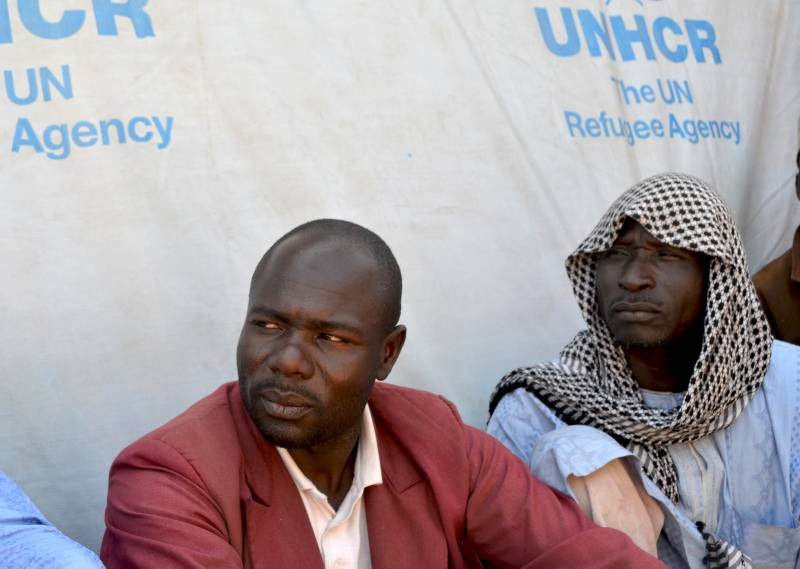
These Nigerian refugees escaped from the town of Baga and crossed Lake Chad by canoe. They are now staying in the Dar es Salam camp in Chad’s Bagasola area. © UNHCR / M.Farman
DAR ES SALAM CAMP, Chad, January 28 (UNHCR) – Thousands of Nigerian refugees have been arriving in western Chad by canoe this month with harrowing tales of the situation in north-east Nigeria, and UNHCR is preparing for a further influx of people amid the continuing violence.
More than 14,000 people have crossed Lake Chad since early January when militants attacked their homes in and around the north-east Nigerian town of Baga, torching homes, killing hundreds and kidnapping people.
The UN Refugee Agency, working with Chadian authorities, is monitoring the arrivals at places like Kangalom and helping to transport people to the Dar Es Salaam camp, which was recently built on government-allocated land and has a capacity for 15,000 people. UNHCR anticipates that more refugees will arrive during the year.
One refugee, Brahim, said he was in Baga on January 3 when the militants attacked in the morning. “There were many of them, all armed with machineguns, AK 47s and RPGs [rocket-propelled grenades],” he said. “We fled into the bush towards the [nearby] lake and got into canoes, but they followed us, even in the deep water, and kept shooting at people in the boats and water.”
The 42-year-old sugar and rice trader, speaking to UNHCR in the Dar es Salam camp near Bagasola, said he saw bodies of men, women and children floating in the lake.
Another refugee, 45-year-old Abdulaye, said his large family had been separated during the attack. “I have four wives and 34 children, but arrived in Chad with only one child,” he revealed, pointing to eight-year-old Ishaq. “We had to flee where we could, in all directions. I don’t know where the others went.”
Abdulaye, Brahim and the others went hungry for many days before reaching Chad. The almost 2,600 refugees currently in Dar es Salam camp are provided with food, shelter and water and have access to medical facilities.
Brahim, like others said he was grateful to the government but wished to go home as soon as possible. That might be far off if the situation in Nigeria continues to deteriorate.
“In the Dar es Salam site we have food, water and many things, but we want to go back. I am a businessman, he is a fisherman, my friend there is a mechanic, Abdulaye is a driver” he said, pointing to individuals in the group. “We want to get back to our lives. There is no work for us here, and we will always be foreigners.”
In addition to assistance provided by humanitarian organizations like UNHCR, the local population has given food and money to help the refugees.
UNHCR, meanwhile, expects more people to arrive and is making preparations to receive and assist up to 30,000 fleeing to Chad in search of protection this year. The refugee agency is setting up an office in the Bagasola area, increasing staff capacity and looking at new partnerships in an area with few NGOs on the ground.
In total, the Nigeria crisis has forcibly displaced an estimated 154,000 people into neighbouring Chad, Cameroon and Niger, and close to 1 million within Nigeria’s six north-eastern states. according to the Nigeria Emergency Management Agency.
By Massoumeh Farman-Farmaian in Dar Es Salam Camp, Chad


